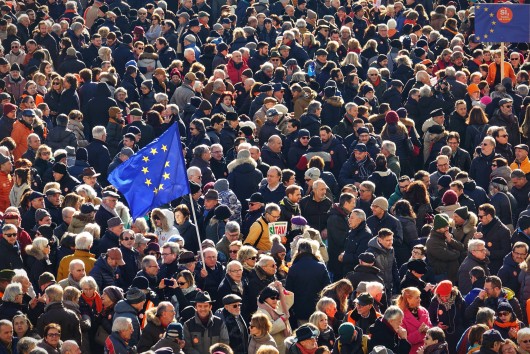The International Day of Democracy on 15 September was adopted by the UN General Assembly in 2007, encouraging governments to strengthen and consolidate democracy. In the EU, 192 million citizens of the European Community were made eligible to vote in the first ever election in 1979 for a parliament that covered nine countries.
Forty-five years later, almost 360 million citizens were given the right to vote in the planet’s biggest multinational exercise in democracy, spanning 27 countries, members of the European Union (EU).
Over the past four and a half decades, European democracy has expanded both geographically and substantively. The European Parliament has grown in its competencies and powers, enhancing its ability to oversee and hold the Commission accountable.
Yet to foster a shared sense of common goals and values, a sense of ‘Europeanness’ among citizens of diverging languages and cultures, the EU must develop more participative tools. Tools that allow the European Agora to develop and thrive, ensuring that political influence is not the sole prerogative of a select few industry lobbyists in Brussels, but is accessible to all citizens.
This has led to the creation of European Citizens’ Initiatives (ECI): a system that enables citizens to formally request the Commission to propose new legislation. Although the acronym ECI is not quite a household brand, it is a Copernican revolution in EU policymaking. In fact, only the Commission has the power to initiate legislation. However, if at least 1 million EU citizens from seven Member States support an ECI, it is obligated to consider their request.
Commission President Ursula von der Leyen has expressed consistent support for the evolution of participatory democracy in Europe, often highlighting its importance in her speeches. “Democracy must be more participative, more vibrant. Civil society must be better supported and defended” stated her July address to the European Parliament as part of her bid for a second term, while she appealed to its members for “support to realise [her] major plan to defend European democracy.”
Few successful European Citizens’ Initiatives
Since the introduction of the ECI in 2012, ten initiatives have garnered sufficient popular support across the Union to warrant consideration by the Commission. Six of these exhort the Commission to take more concrete action on animal welfare and biodiversity loss. Despite this clear message from citizens, surprisingly few ECIs have actually led to legislation.
The majority of successful ECIs has been dedicated to animal welfare but not all made it to the finish line. Recently, 1.5 million citizens signed on to ‘End the Cage Age’, an ECI asking for action to transition away from keeping farm animals in cages. While the response to the initiative was positive and a timeline for new legislation was announced, the Commission left the proposal in limbo at the end of last year.
Another glaring example is the "Save Bees and Farmers" ECI, which called for an 80% reduction of synthetic pesticides by 2030, a transition to ecological farming, and a restoration of biodiversity. Despite collecting over 1 million signatures, the ECI was ultimately ignored by the EU Parliament and the EU Council.
Such inactions raise concerns about the EU’s commitment to democratic participation and its ability to respond effectively to citizen-led initiatives. They highlight the challenges of translating public requests into meaningful policy change, a dismissive attitude that has significant implications for the environment, agriculture, and public health.
Is the Commission backtracking on its commitment to participatory democracy? Ursula von der Leyen still stood before the 720 members of the European Parliament ahead of the European elections in June 2024, reaffirming her commitment by stating, “If it matters to Europeans, it matters to Europe.”
From words to action
There seems to be a gap between political rhetoric, promises and actions. It’s high time the second von der Leyen Commission closes this gap. The starting point should be the priorities and work programme President von der Leyen is preparing for her new Commission. Space needs to be made for legislative activities to address concerns expressed by citizens through successful ECIs.
Participative democracy is a two-way street in which politicians have a duty to empower, and citizens a right to get involved. Over the past decade, groups of citizens have been using the democratic tools at their disposal to ask for, propose or shape better standards for animal welfare and better policies that can help build a food system that is sustainable, humane, and protects our natural resources.
Another recent example shows how participative democracy instruments could work. In January this year she launched the strategic dialogue on the future of EU agriculture. The dialogue group published its report recently. The group brought all stakeholders in the agrifood debate together, from farmers to industry multinationals, from animal protection advocates to pioneers of the transition to healthier, more sustainable food systems.
The Commission was experimenting with a new approach, a civil society-led approach where the stakeholders themselves are required to work together to proactively bring forward common proposals as opposed to reacting to almost finalised Commission texts.
The exercise lasted around 8 months, lightspeed in administrative terms, and published an in-depth report with numerous recommendations. Among those, a recommendation to take forward the revision of the animal welfare legislation including a ban on cages, and recommendations to promote agrobiodiversity and to reduce external inputs such as pesticides. This showed that stakeholders across the board are seized of citizens expectations and the need to include them in EU policy making.
Citizen and civil society mobilisation are not vain, it is not a vacuous term we throw about to feel good about our democracy. It works. It brings about change. It ensures topics that matter - truly matter - to Europeans end up mattering to Europe.
The new Commission will soon be presenting its priorities to the Members of the European Parliament - the home of European democracy. It will also decide if to propose a dedicated Commissioner for Animal Welfare. Citizens and civil society have planted the seeds of policy change; it is now up to Ursula von der Leyen, her team of Commissioners and Members of the European Parliament to better listen and deliver.
European democracy matters!


